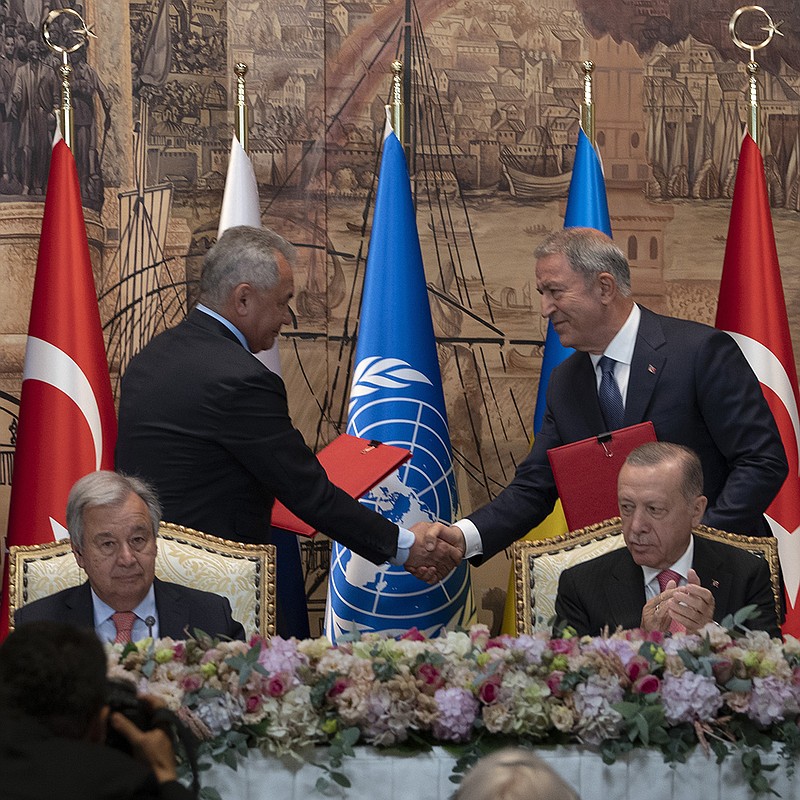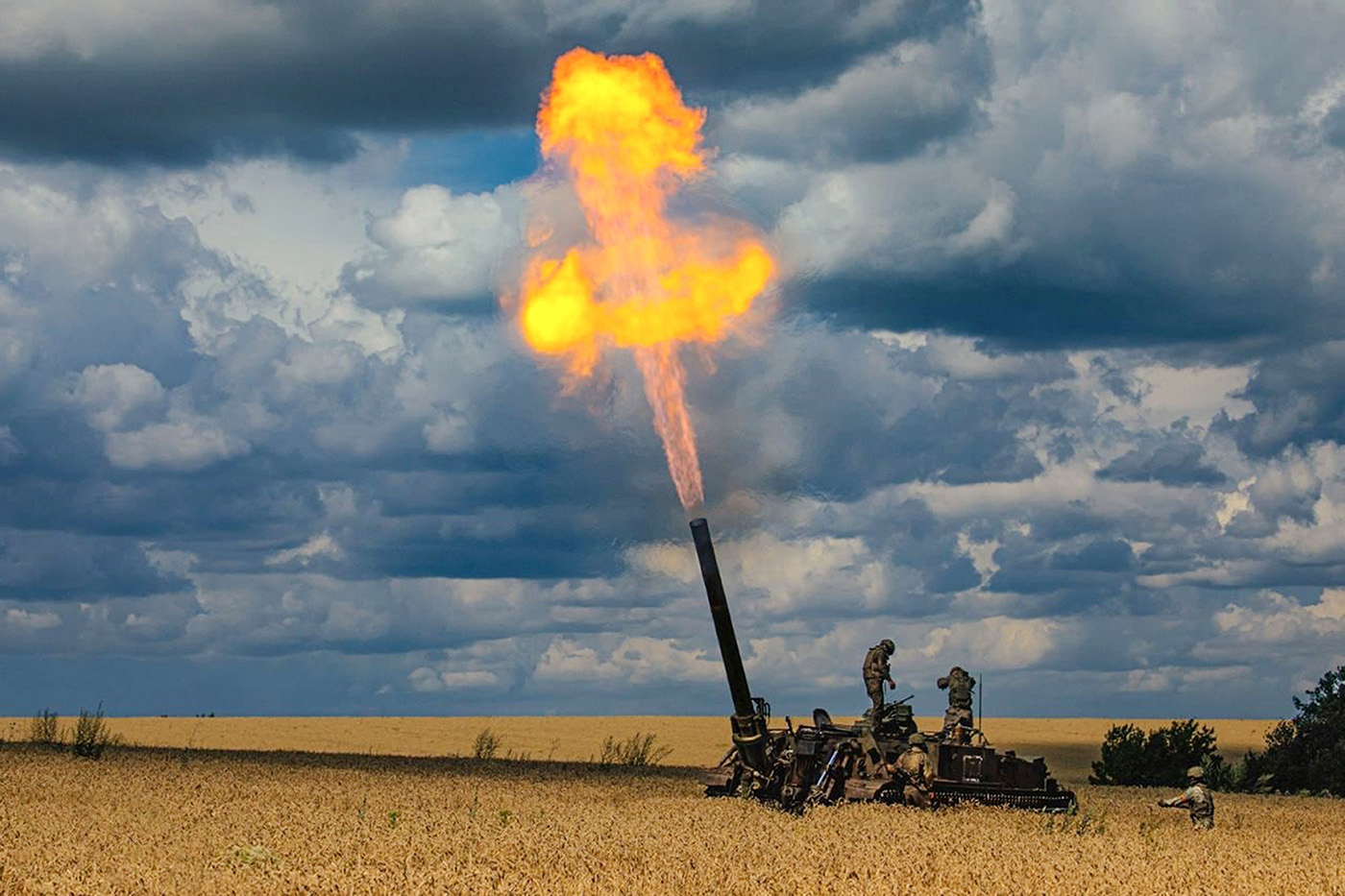BRUSSELS -- After three months of talks that often seemed doomed, Russia and Ukraine signed an agreement Friday to free more than 20 million tons of grain stuck in Ukraine's blockaded Black Sea ports, a deal with global implications for bringing down high food prices and alleviating shortages and a mounting hunger crisis.
Senior United Nations officials said the first shipments out of Odesa and neighboring ports were only weeks away and could quickly bring 5 million tons of Ukrainian food to the world market each month, freeing up storage space for Ukraine's fresh harvests. The difference is expected to be felt most powerfully in the drought-stricken Horn of Africa, which relies heavily on Ukrainian and Russian grain.
The breakthrough, brokered with the help of the United Nations and Turkey, is the most significant compromise between the warring nations since Russia invaded Ukraine in February, but it moves them no closer to peace. While government ministers signed the agreement in an ornate room in Istanbul, with their countries' flags lined up together, a few hundred miles away their troops continued to kill and maim each other.
"This agreement did not come easy," Antonio Guterres, the U.N. secretary-general, said at the signing ceremony, calling the deal a "beacon in the Black Sea."
But Stephen Flynn, founding director of the Global Resilience Institute at Northeastern University, warned that it would be difficult to speedily deliver food to where it is most needed. The mechanics of transporting grain through the Black Sea under wartime conditions with little or no trust between the warring sides are extremely complex.
"It will not move quickly," he said.
It remains to be seen whether the deal works as planned. With each side deeply suspicious of the other, there will be plenty of chances for the agreement to break down.
In Istanbul, Russian Defense Minister Sergei Shoigu repeated Russia's pledge not to use the process of grain exports from Ukraine to its military advantage.
"We have made this commitment," he said.
Russian President Vladimir Putin's assault on Ukraine and the West's sanctions against Russia have had worldwide economic repercussions, impeding trade, contributing to inflation, threatening recession and upending markets, particularly for energy.
But Russia's blockade of Odesa and other ports has produced some of the gravest global consequences, undermining a global food distribution network that was already strained by poor harvests, drought, pandemic-related disruptions and climate change. Western officials accused Putin of using hunger as leverage for sanctions relief.
Ukraine is a leading exporter of wheat, barley, corn and sunflower, but its shipments plummeted after the war began. Exports from Russia, another major supplier, fell as well.
Prices for food staples on world markets soared -- wheat cost about 50% more in May than it did in February.
Prices have since fallen back to prewar levels, but those levels were high, after climbing steadily in the year and a half before the invasion, and stockpiles are low because of the coronavirus pandemic. The United Nations warned of potential famine and political unrest.
"The lifting of these blockades will go some way in easing the extreme hunger that over 18 million people in East Africa are facing, with 3 million already facing catastrophic hunger conditions," Shashwat Saraf, the International Rescue Committee's East Africa Emergency Director, said in a statement.
The deal struck in Istanbul lays out a logistically complex operation to export Ukrainian grain through Turkey, and also offers U.N. assurances to help Russia export its own grain and fertilizer.
Ukraine and Russia have agreed on very little during the war; peace talks went nowhere, and have been set aside for now. The two sides have made several prisoner exchanges and have occasionally agreed on humanitarian evacuations from devastated cities, though always after false starts and mutual accusations of bad faith.
But Friday's pact was the first time that representatives from the warring countries have publicly signed an agreement.
"It's a big step forward," Flynn said, crediting the Turks with an "elegant approach."
The White House welcomed the deal, but with a dose of skepticism. Success "is going to depend on Russia's compliance with this arrangement and actually implementing its commitments," said John Kirby, spokesperson for the National Security Council.
"Russia's word is never good enough on its face," he added, and the United States is "going to be watching very closely."
THE DEAL
Ukraine and other European countries have cobbled together new transport networks using trains, trucks and river barges, raising exports of Ukrainian food to nearly 3 million tons monthly -- still far below prewar levels, but far more than early in the war. Even with the resumption of shipments by sea, it could take up to four months to clear the grain backlog.
The Istanbul agreement will expire after 120 days, officials said, but could be renewed on a rolling basis.
It contains an express commitment that the civilian ships involved, as well as the port facilities used for the operations, will not be attacked, but that could be a tenuous guarantee, and the ships, operating in a war zone, could still be at risk.
There will be no broader maritime cease-fire, and a senior U.N. official said that the Russians did not pledge not to attack the parts of the Ukrainian ports that are not directly used for the grain exports.
Under the terms of the deal, Ukrainian captains will steer the vessels with grain out of Odesa and neighboring ports of Chernomorsk and Yuzhne through safe passages mapped by the Ukrainian navy, to avoid the mines Ukraine has laid to thwart a feared Russian amphibious assault.
A joint command center with Russian, Ukrainian, Turkish and U.N. officials will be set up in Istanbul as of today, U.N. officials said. Teams from all three countries and the United Nations will jointly inspect the vessels in Turkish ports, both as they arrive from Ukraine and they depart, primarily to ensure that they are not carrying weapons back to Ukraine after unloading their grain.
The deal seemed unlikely just two weeks ago, after a series of intense meetings, with the two sides questioning each other's motives and blaming each other for the stalemate.
An early proposal called for removing mines, which Ukraine objected to, and having an international flotilla to escort the grain ships.
A key step forward came when Ukraine agreed instead to have its own captains steer the ships on the first leg of their journeys, and the idea of a military escort was dropped. That made it more of civilian operation, easing concerns that it could trigger a hostile episode.
Getting Russia on board took longer, officials said. It required the United Nations convincing private-sector shipping and insurance companies that they could transport Russian food and fertilizers, which are not directly barred by Western sanctions, without running afoul of other sanctions.
The last piece of the puzzle came Thursday, when the European Union published legally binding clarifications that banks, insurers and other firms were permitted to participate in the export of Russian grain and fertilizers, and its sanctions did not affect the key Russian port of Novorossiysk on the Black Sea. Senior U.N. officials said these assurances were sufficient to persuade the private sector to reengage with Russia's grain trade.
"Today we have all the prerequisites and all the solutions for this process to be started in the coming days," Shoigu told reporters afterward.
Global grain markets reacted immediately to news of the deal. The price of wheat futures fell by more than 5% Friday.
In his nightly video address, Ukrainian President Volodymyr Zelenskyy said the deals offer "a chance to prevent a global catastrophe -- a famine that could lead to political chaos in many countries of the world, in particular in the countries that help us."
SCHOOL HIT
Emergency workers recovered three bodies from a school hit by a Russian strike in eastern Ukraine, officials said Friday, one of a string of attacks on the nation.
Russia this week reiterated its plans to seize territories beyond eastern Ukraine, where the Russian military has been trying to conquer the Donbas region, comprising the Donetsk and Luhansk provinces.
The Ukrainian president's office said that in one Donbas city, Kramatorsk, Russian shelling destroyed a school and damaged 85 residential buildings. Ukraine's state emergencies agency said rescuers found three bodies in the ruins of the school hit Thursday.
"Russian strikes on schools and hospitals are very painful and reflect its true goal of reducing peaceful cities to ruins," Donetsk Gov. Pavlo Kyrylenko said in televised remarks, repeating his call for residents to evacuate.
Russia gave a different account of the attack. Defense Ministry spokesman Lt. Gen. Igor Konashenkov said Thursday's strike killed more than 300 Ukrainian troops using Kramatorsk's School No. 23 as their base. He said another strike destroyed a munitions depot in the southern city of Mykolaiv.
Konashenkov also said Russian forces destroyed four U.S.-supplied High Mobility Artillery Rocket Systems between July 5-20. The U.S. said it has supplied 12 of the multiple-rocket launchers to Ukraine. The claims could not be independently verified.
A senior U.S. defense official, who briefed reporters on condition of anonymity in line with department rules, said Thursday that Russia had not yet taken out a single High Mobility Artillery Rocket System but was likely to "get lucky" and do so at some point.
In the Dnipro region of central Ukraine, three schools were destroyed in the latest Russian strikes, Ukrainian authorities said. Seven Russian missiles hit the small town of Apostolove, wounding 18 residents.
The regional governor, Valentyn Reznichenko, decried the "senseless" attack.
"There are no military goals behind it, and this shelling could only be explained by their desire to keep people on edge and sow panic and fear," Reznichenko said.
RUSSIAN MISSILES
In other developments, the British Defense Ministry said it believes Russia is experiencing "critical shortages" of dedicated ground-attack missiles and therefore has increased its use of air-defense missiles "in secondary ground attack mode."
The ministry said Russia has "almost certainly" deployed S-300 and S-400 strategic air defense systems designed to shoot down aircraft and missiles at long range, and there is a "high chance" of them missing their intended targets and causing civilian casualties.
The senior U.S. defense official said the fight for Donetsk is "likely to last through the summer," with Russia achieving slow gains at high cost. The official said Russia is launching tens of thousands artillery rounds per day but has used a lot of "smarter munitions" and "can't keep it up forever."
Novosibirsk council member Helga Pirogova was charged with disseminating false information about Russia's armed forces and could face up to three years in prison if convicted. The criminal case opened Friday, according to Russian state news agency RIA-Novosti.
Investigators found that she "published deliberately false information under the guise of a reliable message containing data on the use of the Russian Armed Forces," the report said, without giving further details.
The independent Latvia-based news outlet Meduza said the investigation began after a tweet by Pirogova criticizing "luxurious" funerals for Russians killed in Ukraine.
Information for this article was contributed by Matina Stevis-Gridneff of The New York Times and by Susie Blann and Nomaan Merchant of The Associated Press.
Gallery: Images from Ukraine, month 5

